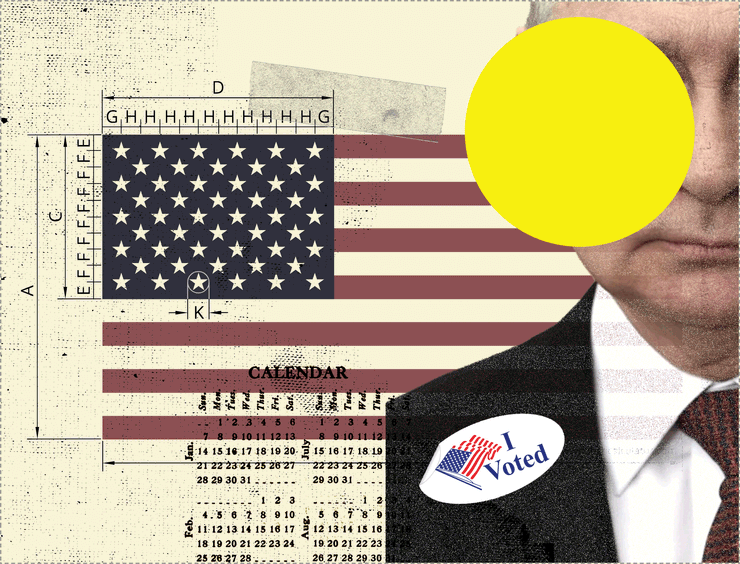The News
Foreign adversaries will seek to take advantage of the divided, divisive U.S. political landscape in the run-up to the presidential election in November, said current and former U.S. officials and politicians from both political parties.
Three major factors — America’s deepening domestic political crises, the collapse of controversial attempts to control political speech on social media, and the rise of generative AI — are likely to turn the 2024 election into a soft target for America’s Russian adversaries — the industry leaders in election interference — but also a range of other enemies and allies with their own agendas.
“Past is prologue, and our foreign adversaries are more motivated than ever to try and interfere in our elections,” the former Secretary of State and Democratic nominee Hillary Clinton said in a statement to Semafor. “In addition to the work our intelligence community will do, our best defense is a good offense, which means getting out to vote like our democracy depends on it, because it does.”
The outcome of the U.S. election, intensely fought at home, carries the highest of stakes for nations at or near war around the world: Russia and Ukraine; Iran and its enemies from the Persian Gulf to Tel Aviv; China and Taiwan. Their options range from misinformation to intelligence operations to disrupting — or smoothing — global oil prices or trade flows this October, should the polls favor the candidate they like or fear.
Russian efforts in 2016 — including the devastating Wikileaks hack and high-profile social media meddling whose impact remains disputed — offer a roadmap for other global players. Where there is broad agreement is on Russia’s demonstrated ability to run influence campaigns, an intelligence community assessment released publicly in December concluded with high confidence that the Russian government tried to denigrate the Democratic Party leading up to the 2022 midterm elections “and undermine confidence in the election, most likely to undermine U.S. support for Ukraine.” It described China and Iran as major threats, and listed other nations — Cuba and a few that are redacted, but analysts believe may include North Korea and Venezuela — as smaller-scale players.
“I think the Chinese are trying to get better at it, I think the Iranians have dabbled in it, and it’s not something that costs a lot of money, so you can imagine more and more nations are going to be engaged in that,” Sen. Marco Rubio, R-Fla., the top Republican on the Senate Intelligence Committee, told Semafor.
Some officials say the U.S. government is underprepared to deal with foreign plots to spread disinformation and misinformation and perhaps launch cyberattacks aimed at the U.S. election, in part because of a lack of communication between the federal government and technology platforms.
“You’ve got this bubbling cauldron of discontent, adversaries more interested, the kind of voluntary collaboration that frankly had worked being put on hold,” Senate Intelligence Committee Chairman Mark Warner, D-Va. said in an interview. “You take in that cauldron and drop in all these new AI tools that can act at scale and speed that’s unprecedented, and you’ve got a recipe for disaster.”
The U.S. government hasn’t yet publicly pointed to specific evidence of foreign nations meddling in the 2024 vote. Officials uncovered “no known, credible, or specific threat” to Tuesday’s election operations, a senior Cybersecurity and Infrastructure Security Agency official told reporters Tuesday evening as polls closed on the East Coast.
Russia Most Feared
The Kremlin has a history of election influence efforts and sources say the Biden administration is most concerned about the prospect of Russian interference.
“I believe the threat from Russia this year will be higher than it has ever been,” said Kat Duffy, senior fellow for digital and cyberspace policy at the Council on Foreign Relations. “The impact that threat will have remains unclear.”
There are disagreements over what Russia’s aim might be. “These nations are probably more benefited not by trying to pick a winner but by trying to create the most chaos possible,” said Jamil Jaffer, a former Bush administration official who directs George Mason University’s national security law program. But Russia also has an obvious policy incentive to intervene on behalf of Donald Trump over President Joe Biden, given Trump’s hostility to NATO and growing GOP opposition to aiding Ukraine.
The recent news that an ex-FBI informant charged with lying about the Biden family’s foreign business dealings allegedly had contacts with Russian intelligence has Democrats on edge. The false claims of the informant, Alexander Smirnov, were central to House Republicans’ efforts to impeach Biden (they have not been deemed part of a Russian election influence scheme).
“Smirnov has illustrated that just anything that strokes the confirmation bias will be elevated in a congressional committee,” said Sen. Jim Himes, D-Conn., the top Democrat on the House Intelligence Committee.
“You have a pathogen and you have a body that the pathogen infects and the body is really vulnerable to it right now,” he continued, “largely because MAGA is so happy to promote even the most bizarre ideas against Biden or against Democrats or whatever it is. It’s just going to be so easy for the Russians.”
Trump’s allies have pushed back on the notion that Russia would prefer him. “Donald Trump was maybe the best president at deterring Russia in a generation,” Sen. J.D. Vance, R-Ohio said at this year’s Munich Security Conference, citing Russian President Vladimir Putin’s comments that Moscow would rather have Biden than Trump.
And some are more worried about the Russians exacerbating existing U.S. social divisions, which the U.S. intelligence community found was one of Moscow’s goals in 2016.
“Russia is the best at it, they’re the most motivated,” said Bret Schafer, a senior fellow at the German Marshall Fund’s Alliance for Securing Democracy. “Any risk aversion that they’ve had in the past is gone.”
Threats from China, Iran
Beijing sought to influence “a handful of midterm races” to counter candidates viewed as anti-China, according to the December U.S. intelligence report, while Iran aimed to undermine confidence in American institutions and exploit existing divisions.
Iran, currently under heavy sanctions and using proxies to attack Americans in the Middle East, also seems to have little fear of the consequences of confrontation. Semafor first reported this week that FBI agents in Florida are hunting an alleged Iranian assassin who may be targeting former Trump Administration officials.
China, analysts and officials say, will be more careful.
“We’re not doing $700 billion in trade with Russia,” Himes said.
Similarly, U.S. allies like Ukraine may have too much at stake to attempt covert intervention. “The risk of getting caught there is pretty great,” said Schafer.
The intelligence community has also identified other influence efforts without disclosing them publicly, but Warner said that those operations are “not the scale of anything that a China, Russia or Iran could do.”
“There are countries that are trying to get viewed more favorably by an American administration and promoting candidates that are friendly to them,” he said. “I think more of it ought to be revealed.”
Other countries that could attempt meddling through cyberattacks or influence operations are North Korea and Venezuela, Schafer said, the latter of which has “relatively sophisticated troll farm operations” and could be “influential at the margins.”
The AI Challenge
U.S. officials got a glimpse of how AI could be used to sway an election earlier this year, when a robocall imitating Biden’s voice surfaced in New Hampshire instructing voters not to cast ballots in the state’s primary. A Democratic operative has since admitted to commissioning the call, and it wasn’t linked to a foreign influence operation.
“We are certainly concerned about generative AI in part because it is more available and more powerful than ever,” a senior administration official told Semafor. “We know that there are a range of actors that are seeking to interfere in our electoral process and undermine the confidence in our election infrastructure and we understand that AI can intensify these existing risks such as making more believable phishing emails to enable cyberattacks, and increase the effectiveness of malign influence operations.”
Sen. Mike Rounds, R-S.D., a member of the Senate Intelligence Committee, said it is incumbent on the federal government and elected officials to put out as much information as possible advising the public of foreign threats to the vote.
“Particularly when you start adding in the new capabilities of AI, it’s going to be much more difficult for the American public to discern between accurate information and misinformation,” Rounds said.
Morgan’s view
The same intense political polarization that makes the U.S. such a ripe target for election interference may prevent the federal government from doing much about it. The Department of Homeland Security is primarily responsible for coordinating with states, which are the main administrators of elections, as well as social media companies in order to knock down foreign propaganda.
But even basic operational cooperation between state election authorities has broken down, as Republican election officials have pulled nine states out of the Election Registration Information Center, a previously uncontroversial system for detecting election irregularities that, to Trump’s anger, failed to find that the 2020 election was stolen from him. The attempts by social media companies to fight “misinformation” have been swallowed by conservative concern that those efforts grew politicized, and claims that the social media companies’ cooperation with federal agencies was censorship. Elon Musk’s X is now an informational free-fire zone.
The Supreme Court later this month will hear oral arguments in a case challenging the Biden administration’s contacts with social media companies about moderating content.
“There’s been a real chill on all of this communication and I think that’s so dangerous,” Warner said, adding that he believed the administration was taking steps to improve guidance given to officials about communicating with the platforms.
Cait Conley, senior advisor at the Department of Homeland Security’s Cybersecurity and Infrastructure Security Agency, said in a statement that the agency is hiring more staff across the country and providing state and local officials with security guidance to navigate potential threats.
“Foreign adversaries have targeted U.S. elections and election infrastructure in previous election cycles, and we expect these threats, to include the threat of foreign influence operations, to continue in 2024,” she said.
The intelligence community has sought in the past to publicly identify foreign election interference. But calling out election interference — particularly against any one candidate — presents a unique challenge for the Biden administration.
“There is just going to be a lot of skepticism because people don’t trust the messengers right now,” Schafer said. “There is going to be a partisan reaction to anything that is detected.”
Room for Disagreement
Cybersecurity expert Dmitri Alperovitch downplayed the threat of foreign influence or interference campaigns, arguing they by and large have not been effective in the past. He also said the 2024 election in particular will be difficult for any foreign actor to impact.
“The attitudes towards both of these candidates is pretty hardened,” Alperovitch told Semafor. “There’s not a lot of people whose minds are going to be changed one way or another.”
Notable
- Ukrainian officials are worried about a Russian disinformation campaign targeting Ukrainian President Volodymyr Zelenskyy, Bloomberg reports.
- CNN recently reported on a December White House Situation Room meeting during which officials gamed out responses to hypothetical scenarios, like one involving an AI-generated video of a candidate destroying ballots.


